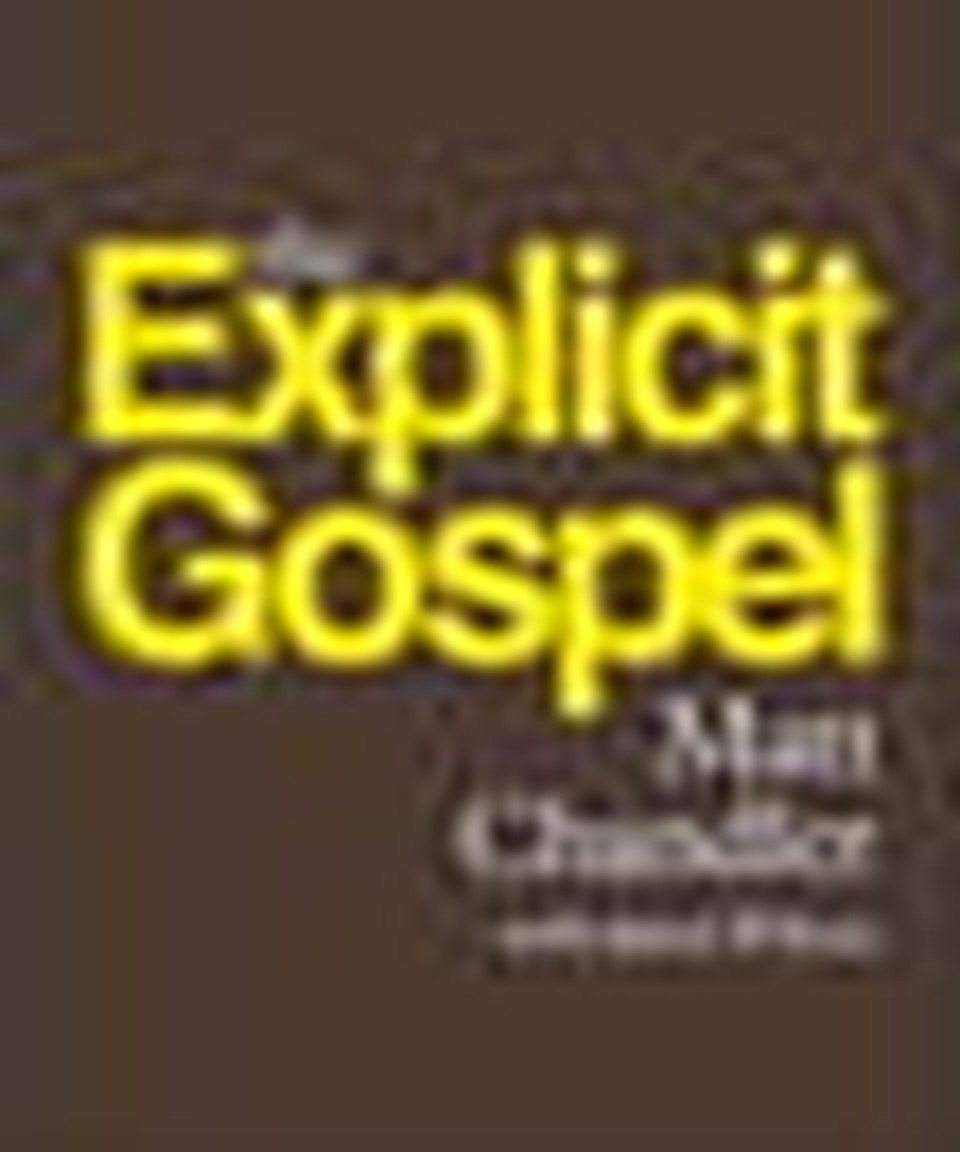The Explicit Gospel: A Response

Editor's note: The following is a review of Matt Chandler and Jared C. Wilson's new book The Explicit Gospel (Crossway Books, 2012).
AN INTRODUCTION TO THE EXPLICIT GOSPEL
Chandler’s (2012) book, The Explicit Gospel, lays an important theological foundation for ministry leaders – a description of the gospel that is explicit for those we lead. The topic is crucial because often the gospel is simply implied in a way that leaves congregants with a sentimental and short-sighted theology. Chandler warns that congregants easily slip into a theology that says, “God wants you to be happy, so be nice.”
Chandler’s book makes the gospel explicit in two conceptual parts. First, he discusses “the gospel on the ground,” and then he discusses “the gospel in the air.” Chandler concludes with a section on the dangers of overemphasizing either the gospel on the ground or the gospel in the air.
THE GOSPEL ON THE GROUND
Chandler’s discussion of the gospel on the ground should be familiar territory for anyone who has made an evangelistic presentation. He divides part one into four chapters: God, man, Christ, and response. Like John Piper, Chandler emphasizes that God exists for His own renown. Contrary to sentimental theology, God did not create mankind because He needed someone to love Him. Instead, God created humanity as one more example of God’s superlative nature. That nature deserves to be worshiped. The problem: human beings choose to give superlative value to things other than God. Doing so is sin.
Sin is a central theme in Chandler’s gospel description. His chapter on man is essentially a chapter on depravity. He goes on to explain that God’s consequences for worshipping anything other than Himself are severe. Yet Christ took those consequences on Himself in a superlative manner, now satisfying God’s just wrath. When we hear this message, one of two things will happen. Option A: our heart will melt, and we will respond in faith to God. Option B: our heart will harden and we will reject that message of grace. So the gospel on the ground is a message about personal salvation, explaining how we can be reconciled to God.
THE GOSPEL IN THE AIR
While many gospel proclamations may be content to stop with personal redemption, Chandler then looks at the cosmic implications of the gospel, which he calls “the gospel in the air.” Here he discusses the creation, fall, reconciliatoin, and final consummation of human history. Among other things, Chandler discusses the age of the creation (calling himself a “historic creationist”) and then returns to the subject of humanity’s sinfulness, explaining that even modern weather catastrophes are the result of human sin. Not only are the consequences of human sin global (even cosmic), but the work of redemption includes all of creation as well, not in some sort of universalist salvation, but rather as response to a creation groaning to be restored (as in Romans 8). And that restoration will occur as part of a cosmic consummation that is the true theme of eschatology. Chandler’s “gospel in the air” is a cosmic redemption.
Chandler’s final three chapters, which comprise part three, then discuss the dangers of an over-emphasis of either the gospel on the ground or the gospel in the air, with a final warning about the dangers of moralism instead of a true gospel message.
A RESPONSE TO THE EXPLICIT GOSPEL
When I picked up Chandler’s book, it intrigued me for two reasons. First was his subject matter. Second was his cosmic sense of the gospel.
I teach at a Christian school that is also an open school, meaning we do not require students to come from Christian families when they enroll here. So I often think about our responsibility to communicate the gospel to these students, but I also want to do so in a way that is appropriate to our educational mission. After all, we are a school and not a church camp. To Chandler’s credit, I came away from reading his book with a renewed sense of mission – making sure we are explicit in our communication of the Gospel.
The second reason Chandler’s book intrigued me was his discussion of “the gospel in the air.” I like his outline of creation, fall, reconciliation, and consummation. In fact, I use a similar outline when I try to tell “The Christian Story.” However, there are two great omissions in Chandler’s Explicit Gospel.
First, his emphasis on human depravity will not convince seekers. Students often ask me about Ghandi’s self-giving work or about the examples of moral living they see in non-Christians. To Chandler’s credit, he does have a response – the problem is that in spite of doing some things right, so-called “good” people choose to worship something besides God expressed through Jesus Christ. Yet I fear that answer will fall emotionally flat. I wish Chandler could have spent time discussing how humans were originally created in the image of God (he briefly mentions the concept on p. 111). My argument: although that image has been marred by sin, enough of it is still present that even the worst among us can occasionally do something right. I also believe that placing the image of God as a fundamental concept in a gospel presentation helps with possible objections to Jesus as both human and divine. Genesis 1shows us that God and humans are not diametrically opposed, but instead there is a connection. At minimum, God put his stamp of approval on humankind, calling our ultimate progenitors “good.” Additionally, God can express his will through human beings – giving them explicit work to do which includes managing His creation. Ironically, Chandler mentions how some reformed commentators sometime overemphasize depravity to the point of neglecting human worth. I fear that if someone only read select chapters of his book, Chandler would be open to that critique as well.
My second critique is that he does not make enough of the resurrection when he discusses Christ in part one or reconciliation in part two. Chandler’s central focus is on the death of Christ as a necessary and perfect sacrifice. Yet he leaves out a discussion of what Paul says to be of “first importance” and that without the resurrection Christians are to be pitied above all other people 1 Corinthians 15:1-31). Chandler does not completely ignore the resurrection, though. He discusses resurrection bodies in his chapter on consummation, and he references 1 Corinthians 15 at least seven times, but I find the lack of extended discussion about Christ’s resurrection to be curious. (Let me admit some bias here. Much of my personal faith is predicated on the central belief that the resurrection was a historical event. If I were to lose that conviction, I’m not sure I would be able to any other Christian convictions).
Those two critiques aside, there are several things Chandler does well. I appreciate his emphasis that we are “reconciled to reconcile” (p. 143). Also, he responds to possible “slippery slopes” in discussions of grace and law or grace and works. He wisely responds to warnings against slippery slopes that a “slope is not a cliff” (p. 175). I take these remarks to remind readers that the Bible does require us sometimes to hold ideas in tension, and it is just such tensions that keep us from slipping into disastrous errors.
His use of Ecclesiastes to discuss humanity’s current plight was also enlightening. Chandler describes how Solomon had the best of what the world could offer, yet the great king was still empty. The fact that even the best of this world cannot satisfy us suggests we are made for is another world (to borrow an argument from C. S. Lewis). And perhaps that is especially good news when we find ourselves struggling to enjoy things we believe should be “good,” like work, family, and friends. Though God’s original purpose for us was to enjoy Shalom in all these arenas, humankind’s fall from grace has marred even the best life has to offer. The good news of Chandler’s Explicit Gospel is that God’s reconciliation and consummation not only make us right with God, but also will one day replace our frustrations with satisfaction eternal. Further, this benefit is not just for us, but for the whole of creation.
Stanley J. Ward is the Director of Campus Life and Ministry at The Brook Hill School in Bullard, TX. He is also author of Worldview Conversations: How to Share Your Faith and Keep Your Friends.
Matt Chandler serves as lead pastor of The Village Church in Highland Village, TX. He describes his 7 year tenure at The Village as a re-planting effort where he was involved in changing the theological and philosophical culture of the congregation. The church has witnessed a tremendous response growing from 160 people to over 5000 including two satellite campuses (Denton and Northway). Alongside his current role as lead pastor, Matt is involved in church planting efforts both locally and internationally through The Village and various strategic partnerships. Prior to accepting the pastorate at The Village, Matt had a vibrant itinerant ministry for over ten years where he spoke to hundreds of thousands of people in America and abroad about the glory of God and beauty of Jesus. His greatest joy outside of Jesus is being married to Lauren and being a dad to their three children, Audrey, Reid, and Norah.
Publication Date: June 19, 2012
Originally published June 19, 2012.




